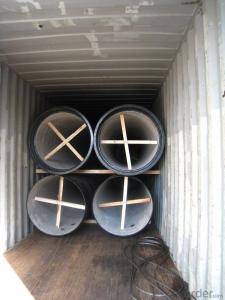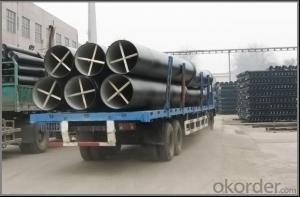DUCTILE IRON PIPE DN1000 K7CLASS
- Loading Port:
- Tianjin
- Payment Terms:
- TT OR LC
- Min Order Qty:
- -
- Supply Capability:
- 30000Tons m/month
OKorder Service Pledge
OKorder Financial Service
You Might Also Like
CNBM ductile iron pipe ranges from DN80-DN1600mm (T-Type, Class K9), effective length 6m, comply with ISO2531 Standard
Company Profile
CNBM International Corporation is the leading production base and renowned supplier of Ductile Iron Water Pipe systems of both potable and waste water in China. We are constantly looking to develop high quality products to ensure the longest service life and wonderful performance.
CNBM Pipelines regard quality as the essential factor leading to successful business. Every pipe is tested in accordance with BS EN545 (water application) or BS EN598 (sewer application). CNBM Pipelines products comply with and are tested according to the relevant European and International Standards. Our pipes are manufactured under the quality management system BS EN ISO 9001. After years of efforts, CNBM Pipelines has built up great reputation in terms of quality and service among customers worldwide
Product Introduction
CNBM ductile iron pipe ranges from DN80-DN1600mm (Tyton, T-Type, Class K7/K8/K9), effective length: 6m, complying with BS EN545/EN598/ISO2531/BS4772.
Specification& Payment terms
Internal lining: Pipes shall have an internal cement mortar lining in acc with ISO4179.
External coating: Pipes shall be externally coated with metallic zinc spray plus a further layer of resin painting to ISO8179.
Gasket: 100% SBR/NBR/EPDM gasket in accordance with ISO4633.
Packing: Pipes from DN100 to DN300 be bundled with steel belts, the others are in bulk.
Payment term: By 30% T/T advance payment + 70% Irrevocable L/C at sight.
Packing: In bulk vessel or in container.
- Q:What are the requirements for the hydrostatic test of ductile iron pipes?
- The hydraulic pressure test shall be carried out in the backfill before trying to allow the pressure after passing the backfill, backfill, the graded gravel fill to 300mm above the top of pipe, and then the soil backfill, backfill process by 200~300 tamped pipeline above 500mm within more than 500 can be used in artificial ramming, mechanical compaction. The degree of compaction shall not be less than 0.93.
- Q:Are ductile iron pipes suitable for use in acidic environments?
- Ductile iron pipes are generally not suitable for use in highly acidic environments. While ductile iron is known for its strength and durability, it does have limitations when it comes to acidic conditions. Acidic environments tend to corrode and degrade ductile iron pipes over time. In acidic conditions, the acid can react with the iron in the pipe, causing corrosion and ultimately leading to pipe failure. The rate of corrosion depends on various factors such as the concentration and type of acid, temperature, and the duration of exposure. Acidic environments with pH levels below 4 or 5 can significantly accelerate the corrosion process. To overcome this limitation, other materials like stainless steel or corrosion-resistant alloys such as PVC or HDPE (high-density polyethylene) pipes are often recommended for use in acidic environments. These materials have better resistance to corrosion and can withstand the harsh conditions associated with acidic environments. However, if ductile iron pipes are used in mildly acidic conditions or if measures are taken to protect them from corrosion, they may still be suitable. Applying protective coatings or linings to the pipes can help minimize the corrosive effects of acids. It is essential to consult with experts or engineers familiar with the specific conditions and requirements of the project to determine the most suitable material for use in acidic environments.
- Q:What is the expected surge pressure rating of ductile iron pipes?
- The expected surge pressure rating of ductile iron pipes can vary depending on factors such as pipe diameter, wall thickness, and application. However, generally speaking, ductile iron pipes have a surge pressure rating that ranges from 350 psi to 500 psi.
- Q:Can ductile iron pipes be used for underground chemical processing systems?
- Ductile iron pipes are generally not recommended for use in underground chemical processing systems due to their limited resistance to corrosion from various chemicals. While ductile iron pipes are known for their strength, durability, and flexibility, they are still vulnerable to corrosion when exposed to certain chemicals, especially those with high acidity or alkalinity. In underground chemical processing systems, there is a higher risk of exposure to corrosive substances that can deteriorate the ductile iron pipes over time. This can lead to leaks, cracks, and failures in the piping system, compromising its integrity and potentially causing hazardous conditions. For underground chemical processing systems, it is advisable to consider alternative materials that are more resistant to corrosion, such as stainless steel, PVC, or high-density polyethylene (HDPE) pipes. These materials offer superior chemical resistance and can withstand the harsh conditions typically present in chemical processing environments. It is crucial to consult with experts in chemical engineering, piping design, and corrosion resistance to determine the most suitable materials for underground chemical processing systems. Proper material selection is vital to ensure the longevity and safety of the piping infrastructure in such environments.
- Q:Can ductile iron pipes be used for offshore oil and gas installations?
- Yes, ductile iron pipes can be used for offshore oil and gas installations. Ductile iron is a type of cast iron that offers excellent strength and durability, making it suitable for various applications including offshore environments. These pipes have high tensile strength and are resistant to corrosion, making them ideal for transporting oil and gas in harsh offshore conditions. Ductile iron pipes are often used for subsea pipelines, risers, and flowlines due to their ability to withstand high pressures and resist external forces such as waves, currents, and impacts. They are also capable of handling the high temperatures and pressures associated with offshore oil and gas production. Furthermore, ductile iron pipes have a long service life and require minimal maintenance, reducing the overall operating costs for offshore installations. They are also readily available and cost-effective compared to other materials such as steel. However, it is important to consider factors such as the specific requirements of the project, environmental conditions, and the compatibility of ductile iron with other materials used in the offshore installation. Proper engineering analysis and design considerations should be undertaken to ensure the suitability and safety of ductile iron pipes for offshore oil and gas installations.
- Q:There are several forms of flexible interfaces for Spigot Cast Iron Pipes
- Japan's Kubota ductile mechanical interface, in recent years has been introduced to China. As in the Beijing water pipeline construction from the Miyun reservoir to the Huairou reservoir, the use of a large number of nodular type DN2600mmK mechanical interface of cast iron pipe.The mechanical interface of ductile iron pipe is divided into A and K. The tubes and fittings are made of ductile iron, straight pipes, screws, bolts and rubber rings.The mechanical interface has good sealing performance. When the water pressure reaches 2MPa in the test, there is no leakage. The axial displacement and the angle of folding all reach a high level, but the cost is higher.
- Q:Are ductile iron pipes more expensive than other pipe materials?
- Ductile iron pipes can be more expensive than some other pipe materials, but it depends on various factors. Ductile iron pipes are known for their durability, strength, and corrosion resistance, which can make them a cost-effective choice in the long run. However, the initial cost of ductile iron pipes can be higher compared to materials like PVC or HDPE. Additionally, the installation process for ductile iron pipes may require more labor and specialized equipment, adding to the overall cost. However, it is important to consider the specific project requirements, including factors like the environment, expected lifespan, and required pressure ratings, when evaluating the overall cost-effectiveness of ductile iron pipes compared to other pipe materials.
- Q:What are the typical maintenance requirements for ductile iron pipe?
- The typical maintenance requirements for ductile iron pipe include regular inspections for signs of corrosion or damage, cleaning and flushing to remove sediment and debris, and occasional repair or replacement of sections that are worn or leaking. Additionally, applying protective coatings or linings can help prolong the lifespan of the pipe and prevent corrosion.
- Q:What is the maximum allowable joint deflection for ductile iron pipes?
- Industry standards and guidelines typically specify the maximum allowable joint deflection for ductile iron pipes. These standards can vary depending on the specific application and local regulations. Typically, the maximum allowable joint deflection for ductile iron pipes is limited to a range of 1% to 5% of the pipe diameter. This means that the pipe can tolerate a deflection of up to 1% to 5% of its diameter without causing significant damage or compromising its structural integrity. However, it is important to consider factors such as pipe size, wall thickness, and operating conditions as these can affect the exact maximum allowable joint deflection. For specific guidelines on the maximum allowable joint deflection for ductile iron pipes in a given application, it is recommended to consult relevant industry standards like those published by the American Water Works Association (AWWA) or the International Organization for Standardization (ISO).
- Q:Are ductile iron pipes suitable for bridge piers or abutments?
- Yes, ductile iron pipes are suitable for bridge piers or abutments. Ductile iron is known for its high strength and durability, making it a reliable choice for supporting heavy loads in bridge construction. Additionally, ductile iron pipes are corrosion-resistant, which is crucial for structures exposed to moisture and environmental factors.
1. Manufacturer Overview |
|
|---|---|
| Location | |
| Year Established | |
| Annual Output Value | |
| Main Markets | |
| Company Certifications | |
2. Manufacturer Certificates |
|
|---|---|
| a) Certification Name | |
| Range | |
| Reference | |
| Validity Period | |
3. Manufacturer Capability |
|
|---|---|
| a)Trade Capacity | |
| Nearest Port | |
| Export Percentage | |
| No.of Employees in Trade Department | |
| Language Spoken: | |
| b)Factory Information | |
| Factory Size: | |
| No. of Production Lines | |
| Contract Manufacturing | |
| Product Price Range | |
Send your message to us
DUCTILE IRON PIPE DN1000 K7CLASS
- Loading Port:
- Tianjin
- Payment Terms:
- TT OR LC
- Min Order Qty:
- -
- Supply Capability:
- 30000Tons m/month
OKorder Service Pledge
OKorder Financial Service
Similar products
New products
Hot products
Related keywords



























